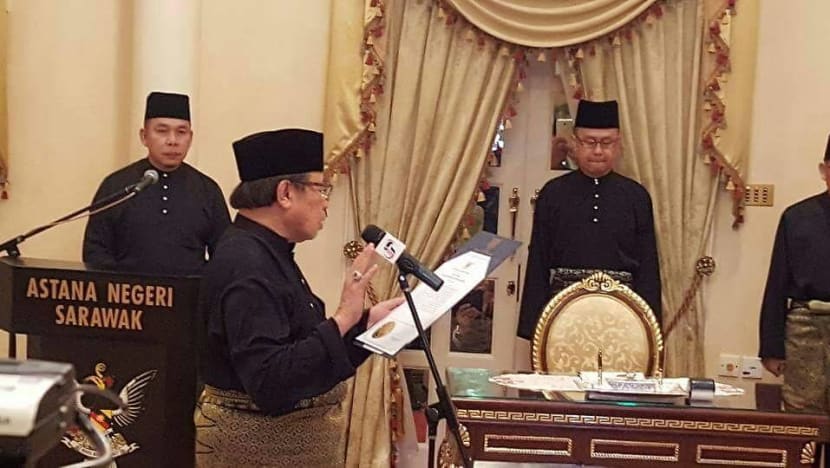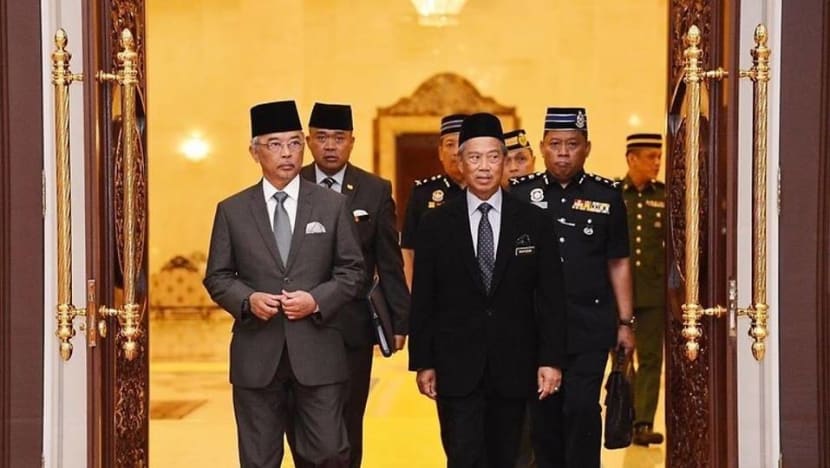Commentary: Could Sarawak state elections be the kingmaker for Kuala Lumpur?
Malaysia’s governing coalition has an increasingly tenuous hold on the reins of power. Any coalition eyeing power will have to look at the eastern state of Sarawak, says an observer.

Abang Johari was sworn in as the new chief minister of Sarawak on Friday (Jan 13). (Photo: Minister Wan Junaidi)
SINGAPORE: The political ructions in Malaysia’s corridors of power this week have effectively led to Prime Minister Muhyiddin’s governing coalition losing its majority. There are many moving pieces in the fluid political landscape now.
One thing is sure, however – the state elections in Sarawak will have a direct bearing on any coalition which would emerge from the wheeling and dealing in the weeks to come.
On Jul 26, Takiyuddin Hassan, the Minister in the Prime Minister’s Department, announced that the Perikatan Nasional government would not extend the current emergency ordinances beyond Aug 1. This resulted in a flurry of reactions.
The Yang di-Pertuan Agong expressed great disappointment and dismay that the government did not present the revocation of the ordinances in parliament. The Agong was also disappointed that his consent was not sought on ending these ordinances.
To compound matters, up to a dozen Members of Parliament (MPs) from the United Malays National Organisation (Umno) said on Wednesday (Aug 4) that they had withdrawn support from Perikatan. Theoretically, this means that the premier’s coalition has lost its majority in parliament.
This is where Sarawak comes into the picture. Sarawak MPs hold 18 seats in the federal parliament.
If the ruling Gabungan Parti Sarawak (GPS) coalition in Sarawak wins the state election comfortably, it may be in a better bargaining position nationally as it would also be expected to improve the number of federal parliamentary seats when Malaysia’s general election takes place.
Given that GPS MPs have indicated support for Perikatan — and not for the opposition Pakatan Harapan because it includes the Democratic Action Party (DAP) — GPS could well emerge as kingmakers in any governing coalition in Kuala Lumpur.
WHEN WILL ELECTIONS TAKE PLACE
Given the national context, the question here is when the state elections in Sarawak would be held. The present state legislative assembly ended its term on Jun 6, 2021. Given that the emergency was slated to last till Aug 1, Sarawak has to carry out elections within 60 days from Aug 2.
On Jul 31, the Cabinet declared that Sarawak would remain in a state of emergency until Feb 2, 2022. In the meantime, state elections would not be held to keep the pandemic in check. Abang Johari, the Chief Minister of Sarawak, welcomed this since the imperative is to safeguard public health rather than hold state polls.
Deputy Chief Minister James Masing was quick to interject that if Sarawak could flatten the COVID-19 curve within the next few weeks, they would consult with the King to lift the emergency and allow state elections to take place earlier.
Masing added that with stringent standard operating procedures (SOPs) in place, an election could be held without endangering public health. He added that Sarawak had taken to heart the lessons learnt from the Sabah state election in September 2020, when a lack of strict controls led to a spike in COVID-19 cases.
Since 1978, Sarawak’s state electoral cycle has differed from other Malaysian states. The prerogative lies with each state to decide when to hold its election, but states have usually held their elections simultaneously with parliamentary elections.
In 1978, Sarawak chose not to hold its state polls because it wanted to disassociate itself from the politics in the Peninsula then. Over time, Sarawak’s unique practice of holding state elections in a different time frame from national polls held fast.

IMPACT OF COVID-19
Sarawak was once considered one of the safest states when it comes to the COVID-19 pandemic. But it has been battling hundreds of infections a day since February, when an individual from Johor underwent home quarantine in the state. Now that the highly infectious Delta variant is present in Sarawak, case numbers may escalate again.
As of Jul 22, Sarawak’s vaccination rate — at 77.3 per cent — was the highest of all Malaysian states. This is expected to hit 80 per cent by end-August.
In Sarawak, three types of vaccines are being administered: Pfizer-BioNTech, Sinovac and AstraZeneca. Sinovac has recorded the least effective against the Delta variant; this will have implications for Sarawak’s Covid resilience.
It is understood that 2 million doses of Sinovac have been delivered to Sarawak.
How the state elections in Sarawak pan out amid the pandemic will be a bellwether of whether general elections would follow.
If they are allowed, postal votes for Sarawakians residing in other Malaysian states will reduce cross-state infections. After all, those travelling across the state to vote could well cause another wave of infections.
There must be strict enforcement. New online approaches to campaigning will also be necessary, but these will have limitations, as those living in rural Sarawak have very limited online access. Radio air time must therefore be given to all parties to allow for greater outreach.
In Kuala Lumpur, any coalition seeking power would be keenly aware that they would have to lure Sarawak’s clutch of MPs to their side so as to bolster their chances of grabbing the reins of power.
It is unlikely that Perikatan or a competing coalition would devolve more autonomous powers to Sarawak. Yet, any coalition would seek to maintain the status quo and focus on disbursing more development funds to East Malaysia and creating a second deputy Prime Minister position filled by someone from the region.
How the state elections in Sarawak pan out amid the pandemic will be a bellwether of whether general elections would follow. If he is still in power, PM Muhyiddin Yassin may be motivated to hold a general election if he is able to sew up a deal with Sarawak MPs.
Traditionally, the number of federal seats held by Sarawak parties has been closely monitored. With the pandemic raging and the concurrent political machinations happening in the capital, the eastern state would attract even more political attention in the coming months.
Dr Lee Poh Onn is Senior Fellow with the Regional Economic Studies Programme and Malaysian Studies Programme at ISEAS – Yusof Ishak Institute. This commentary was first published in ISEAS – Yusof Ishak Institute's Fulcrum.

















